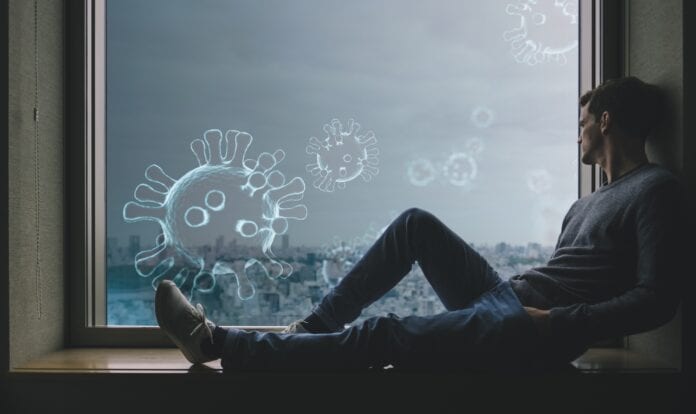More than half of people who had to self-isolate felt it negatively affected their mental health with more than a quarter saying it negatively affected their income, Swansea University research has revealed.
A study also found that 75 per cent those self-isolating said no one from the contact tracing service checked on their wellbeing while they isolated and 60 per cent either hadn’t heard about the £500 self-isolation support scheme or didn’t know how to apply for it.
But the researchers discovered that despite these challenges, compliance with self-isolation was very high, with 80 per cent fully complying with guidelines and just 1 per cent reporting they didn’t self-isolate at all.
The study, carried out on behalf of the Welsh Government/Senedd Cymru, offers insight into the financial, social and emotional impact of self-isolation, and sets out what needs to be done to better support individuals and their families during this difficult time.
The research was led by Dr Simon Williams, Senior Lecturer in People and Organisation and Dr Kimberly Dienes, Lecturer in Clinical and Health Psychology in collaboration with Dr Paul White, Associate Professor in People and Organisation.
Dr Williams said: “We found that self-isolation was negatively impacting many people’s mental health. In many cases, losing that little bit of freedom, for example the ability to go out for exercise or to the shops for essential items, made a big difference to their emotional wellbeing. Although most people were able to get what essentials they needed from friends and family, self-isolation to some felt ‘claustrophobic’ or like being in ‘prison’.
“Our research suggests that compliance with self-isolation was very high, but also there is a minority who are not complying to varying degrees. Amongst those not sticking to the rules, there was a spectrum of behaviours from those who didn’t self-isolate at all, to those who went out for the odd jog at 5am in the morning.”
The researchers recommend that all those asked to self-isolate should consistently have their mental health and financial situation checked on during self-isolation. Those identified as needing further assistance should be provided with information and guidance by contact tracers in order to access mental health support services or financial assistance such as the self-isolation payment.
The study’s other findings include:
- People who self-isolated reported physical health challenges – lack of exercise, unusual aches and pains – (46 per cent), mental health challenges – anxiety, feeling down, loneliness – (46 per cent), and trouble adjusting their daily routine (34 per cent). Other challenges which may require additional support included lack of access to essentials (20 per cent), care commitment challenges (14 per cent) and financial challenges (12 per cent).
- There was a great deal of variability in how long people waited between when they felt they were exposed to the virus and when they were contacted and told to self-isolate and in how often they were contacted after being told to self-isolate.
Dr Dienes said: “It was clear from our results that the majority of people are adhering to the request to self-isolate and feel the instructions were clear, but they need more support to self-isolate, both financially and emotionally. A greater emphasis on the Protect in Test, Trace, Protect is needed.
“Additionally, we need to reach the small group of people who feel they are unable to self-isolate, understand their reasons, and provide them with needed support.”
The study has been published by Senedd Research and is available to read in full.
It combined quantitative questionnaires with qualitative interviews conducted in December 2020 and January 2021. It included both those who self-isolated as a result of testing positive for coronavirus, those contacted directly by NHS contact tracers after being identified as a positive case or a close contact, as well as those who were advised to self-isolate via other means such as the NHS contact tracing app.
Dr Williams added: “We recommend that all those being asked to self-isolate should receive more consistent advice and support across the board to help protect their financial security and mental health during self-isolation.
“Regardless of whether someone is being asked to self-isolate because they have tested positive or whether they have been in contact with someone who has, and regardless of whether they are being asked to do so by a contact tracer or the app, everyone should be asked ‘is your income going to be affected by having to self-isolate?’ and ‘how are you feeling about having to self-isolate?’
“This could help to systematically identify those who may be in need of further support but who are unaware of what resources are available to them.”
Help keep news FREE for our readers
Supporting your local community newspaper/online news outlet is crucial now more than ever. If you believe in independent journalism, then consider making a valuable contribution by making a one-time or monthly donation. We operate in rural areas where providing unbiased news can be challenging. Read More About Supporting The West Wales Chronicle


















